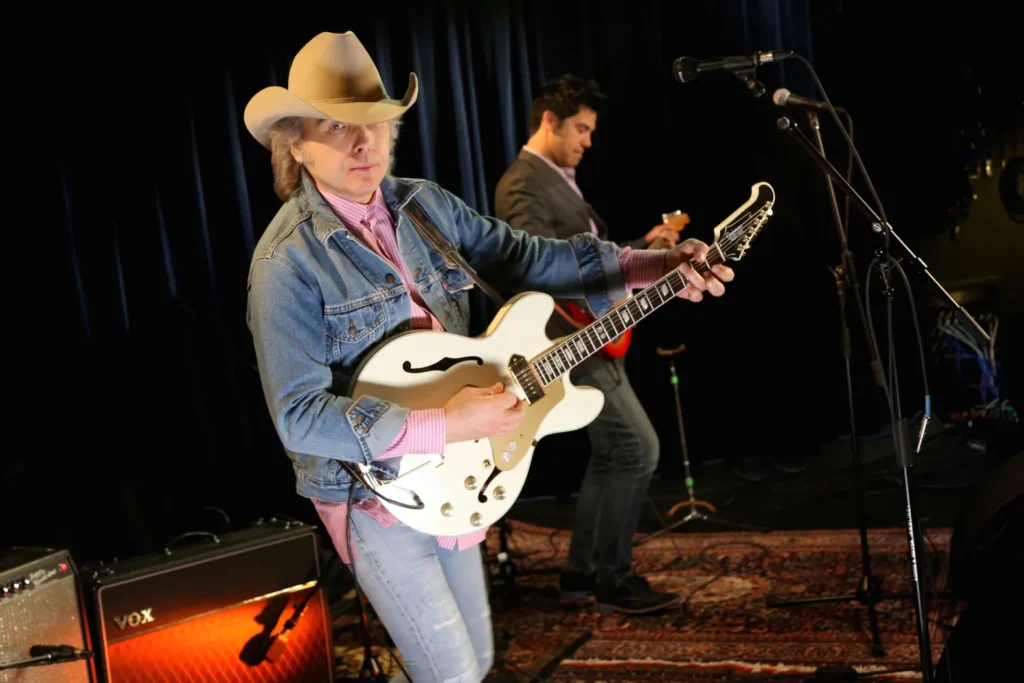
A Bakersfield-leaning handshake with Johnny Cash—plain talk, bright twang, and a boundary spoken kindly.
Start with the anchors, so the feeling has something firm to hold. Dwight Yoakam cut “Understand Your Man” as the opening track on the tribute set Kindred Spirits: A Tribute to the Songs of Johnny Cash, released September 24, 2002. On that album Yoakam’s version clocks in at a tidy 3:11, and—fittingly for a salute—it wasn’t worked to radio as a standalone single. The album itself reached No. 17 on Billboard’s Top Country Albums and No. 140 on the Billboard 200, a quiet but respectable showing for a project built around reverence more than chart games.
A word about bloodline—briefly, then back to Yoakam. Johnny Cash wrote and first released “Understand Your Man” in January 1964; it became a monster, spending six weeks at No. 1 on the country chart and even slipping into the pop Top 40 at No. 35. It’s the sound of firm boundaries stated in plain English, set to a mid-tempo sway you could walk a mile to. That’s the core Yoakam honors.
What Yoakam brings—especially for those of us who’ve lived with both artists for decades—is clarity. He doesn’t try to out-gravitas Cash; he translates him into the California grammar that has always suited Yoakam best. The band (under the long-shadow collaboration with Pete Anderson) tightens the backbeat and brightens the guitars; a Telecaster snaps answers across the vocal, the drums walk instead of stomp, and the bass keeps the lane clean so Yoakam can do what he does: round the vowels, clip the consonants, and make a hard truth sound humane. Where Cash’s original could feel like a front-porch lecture, Yoakam’s reading is more like a calm conversation in a long, neon-lit room—less thunder, same resolve. The placement as Track 1 isn’t accidental; the producers stack the album so Yoakam’s Bakersfield snap opens the door for everyone else’s tributes to walk through.
The lyric, heard through Yoakam’s timbre, lands with that older, quieter courage: don’t call my name out your window when I’m leavin’ isn’t swagger, it’s self-preservation. Many of us learned the hard way that love needs room to breathe, and that good intentions can still turn into a tug. Yoakam underlines that hard lesson by refusing to dramatize it. He never raises his voice. He sidesteps the temptation to over-ornament lines Cash carved out of plain speech. The electric fills feel like a friend backing you up—steadying, not showing off. If you’ve ever practiced the art of leaving kindly, you’ll recognize the posture instantly.
There’s lore at the edges that makes the song feel even more like a conversation across time. Cash’s tune has long been noted for tracing the contours of Bob Dylan’s “Don’t Think Twice, It’s All Right”—that same patient lope, the same grown-up acceptance tucked inside the phrasing. Whether you hear that echo or not, Yoakam’s take reminds you why the song endures: it’s not about payback; it’s about clarity. On a tribute album that also features Cash’s family, friends, and fellow travelers, Yoakam’s opener works like a tuning fork—strike it, and the rest of the record rings true.
But the reason older ears keep coming back isn’t the ledger—it’s the temperature of the performance. Yoakam’s rhythm section holds the floor like seasoned dancers; the guitars gleam without glare; the vocal sits close, as if he’s careful not to spook the fragile peace that follows a decision made at last. The hook doesn’t crow. It settles. That’s how you know the promise is true. And for three concise minutes, you get that rarest of country-music gifts: a hard boundary drawn without bitterness, sung with enough daylight in it that the door can stay unlocked.
Put this track first in a late-evening run of Yoakam if you want to feel the whole arc. Start here—bright Telecaster, clean pocket, a vow stated plainly—and listen to how it throws a friendly light backward to Cash and forward to every boundary you’ve drawn since. Some songs show you the storm. This one shows you the weather after: the air cooler, the sky clearer, and a man walking out into it with his head up. That’s not defiance. That’s adulthood—and Yoakam gets it exactly right.